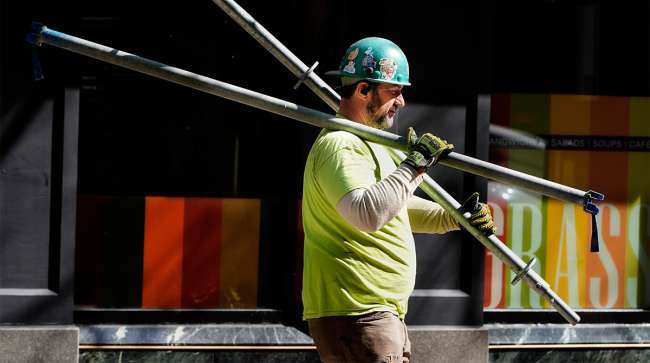Associated Press
US Employers Added Just 114,000 Jobs in July

[Stay on top of transportation news: Get TTNews in your inbox.]
WASHINGTON — U.S. hiring decelerated sharply last month in the face of high interest rates as employers added an unexpectedly weak 114,000 jobs.
The Aug. 2 Labor Department report showed a drop from the 179,000 jobs created in June. Forecasters had expected to see 175,000 jobs in July. The unemployment rate rose to 4.3%, highest since October 2021, as the number of jobless Americans rose by 352,000.
The economy had proven unexpectedly sturdy in the face of the Federal Reserve’s campaign to tame inflation with high interest rates. The Fed raised its benchmark rate 11 times in 2022 and 2023, taking it to a 23-year high. But the higher borrowing costs appear to be taking a toll.
The unemployment rate has risen for four consecutive months. Its jump to 4.3% in July crossed a tripwire that historically has signaled that the United States is in recession — though economists say the gauge probably is not reliable in the topsy-turvy post-pandemic economy.
Unemployment rate rises to 4.3% in July; payroll employment edges up by 114,000 #JobsReport #BLSdata https://t.co/ZwrVfLviqL — BLS-Labor Statistics (@BLS_gov) August 2, 2024
In another sign that the labor market is cooling, average hourly wages rose just 3.6% from July 2023, smallest year-over-year gain since May 2021 and a development likely to ease inflationary pressure in the economy.
Jobs gains were also concentrated in a few industries. Health care and social assistance firms added 64,000 jobs last month, accounting for 56% of hiring. Restaurants, hotels and bars added nearly 26,000 jobs.
The economy is weighing heavily on voters’ minds as they prepare for the presidential election in November. Many are unimpressed with the strong job gains of the past three years, exasperated instead by high prices. Two years ago, inflation hit a four-decade high. The price increases eased, but consumers are still paying 19% more for goods and services overall than they were before inflation first heated up in spring 2021.
Employment characteristics of transportation and warehousing industries https://t.co/ziNpU0QOse #BLSdata pic.twitter.com/Kde5wBTMo3 — BLS-Labor Statistics (@BLS_gov) August 1, 2024
The so-called Sahm Rule, named for the former Fed economist who came up with it, Claudia Sahm, holds that a recession is almost always already underway if the unemployment rate (based on a three-month moving average) rises by half a percentage point from its low of the past year. The jump to 4.3% crossed the threshold.
Still, Sahm, now chief economist at the investment firm New Century Advisors, said before the report that this time “a recession is not imminent’’ even if unemployment crosses the Sahm Rule threshold.
America’s jobs numbers have been unsettled by an unexpected surge in immigration — much of it illegal — over the past couple of years. The new arrivals have poured into the American labor force and helped ease labor shortages across the economy — but not all of them have found jobs right away, pushing up the jobless rate. Moreover, people who have entered the country illegally are less inclined to respond to the Labor Department’s jobs survey, meaning they can go uncounted as employed, notes Oxford’s Martin.
Nonetheless, Sahm remains concerned about the hiring slowdown, noting that a deteriorating job market can feed on itself.
Want more news? Listen to today's daily briefing above or go here for more info
“Once you have a certain momentum going to the downside, it often can get going,’’ Sahm said. The Sahm rule, she says, is “not working like it usually does, but it shouldn’t be ignored.’’
Sahm had urged Fed policymakers to pre-emptively cut their benchmark interest rate at their meeting this week, but they chose to leave it unchanged at the highest level in 23 years. They are widely expected to start reducing the rate at their next meeting in September.
Economists on Aug. 2 were questioning whether the Fed had waited too long to start easing borrowing costs. “Oh dear, has the Fed made a policy mistake?’’ said Seema Shah, chief global strategist at Principal Asset Management. “The labor market’s slowdown is now materializing with more clarity ... a September rate cut is in the bag and the Fed will be hoping that they haven’t, once again, been too slow to act.’’

